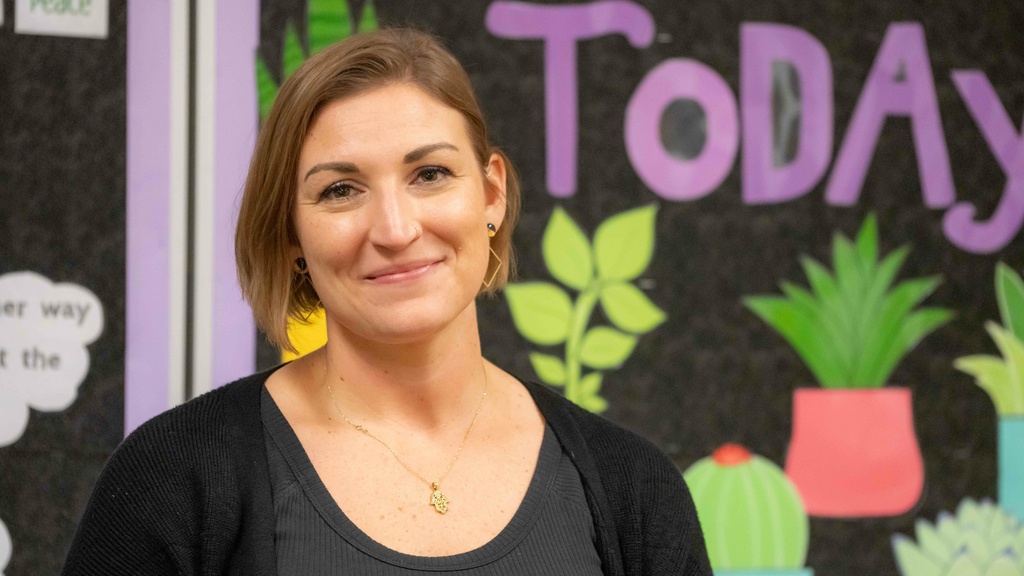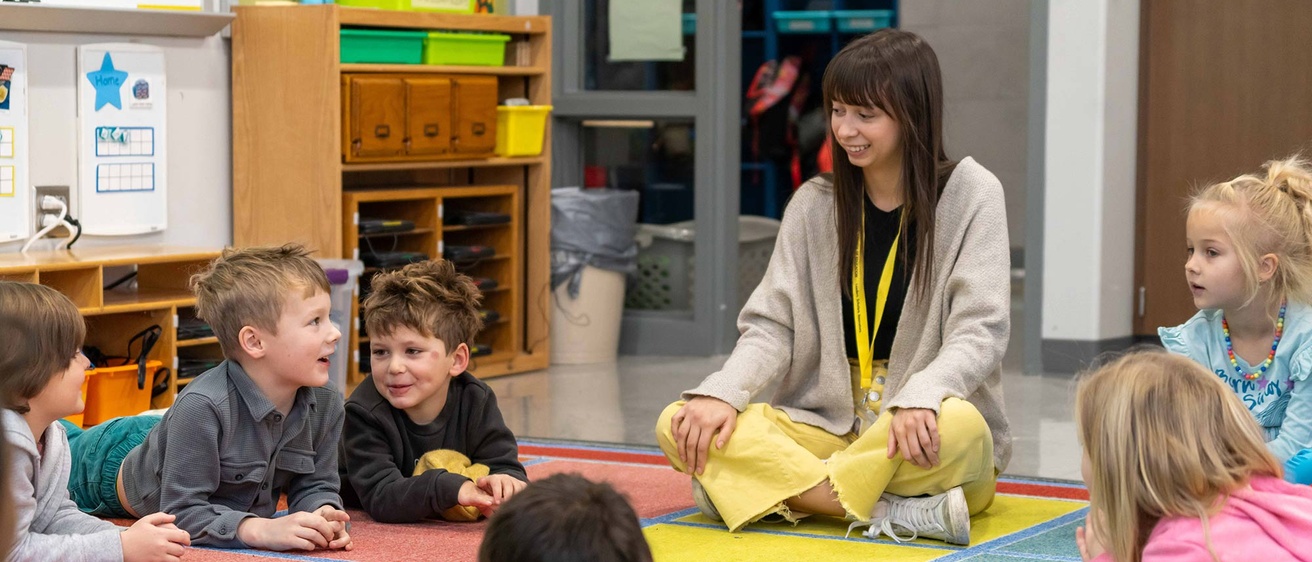The Master of Arts in School Counseling program trains future school counselors to identify and meet the academic, social-emotional, and career needs of K-12 students through the development of data-driven programs, comprehensive service delivery, collaboration with staff and families, and attention to their unique and diverse identities and abilities.
# 12
(U.S. News & World Report)
Top-ranked student counseling program
Program Overview
Upon graduation from our nationally-ranked school counseling MA program, our school counseling graduates are already on their journey to becoming advocates, leaders, and change-agents in K-12 schools.
Your program advisor will help guide you through the requirements for degree completion. Our CACREP accredited program can be completed in two years. All program faculty have previous experience working as school counselors and bring this knowledge into the classroom. We also have a 100% job placement rate.
Currently, there is a graduate funding opportunity (MPath grant) students in our program can apply for to help cover the costs of tuition.
Practicum and Internships
We are committed to providing training experiences that promote culturally-responsive counseling practice and comprehensive program design. Our cohort-based program offers student-centered evening classes in a collaborative learning environment. Students are placed for practicum and internship experiences in vetted and arranged site placements in a variety of K-12 schools.
Licensure and Job Placement
Once students graduate, they are immediately granted a K-12 license to practice school counseling in Iowa schools. We have a 100% placement rate and maintain strong relationships with school administrators, school counseling supervisors, and state and national counseling organizations.
Faculty and Research
Our program is led by nationally-recognized school counseling faculty with extensive experiences as practicing school counselors and expertise in mental health interventions in schools.
To see associated faculty, please: Visit Faculty Listing
Areas of expertise include:
- Social emotional learning
- Suicide prevention
- Career counseling
- Counseling assessment
- Gifted education
Counselor's Corner
Faculty share tips and insights on topics and issues that will empower school counselors with best practices, the latest research, and valuable resources.
Admissions and Application
February 1 – priority deadline (summer or fall semester). Faculty will begin reviewing applications and will continue until the cohort is filled.
Admission Requirements
No one criterion is used in selecting candidates. All interested persons are encouraged to apply. In reviewing applications, the faculty considers the relevant qualifications of candidates across all required areas.
- A bachelor’s degree from a Regionally Accredited American College or University, or an equivalent degree from another country as determined by the Office of Admissions.
- Undergraduate grade-point average (GPA) of 3.00 or better on a four-point scale.
- Graduate GPA or 3.0 or better on a four-point scale.
- English Proficiency Requirements (international applicants)
- Interview with faculty.
- Students may be required to complete a national background check prior to clinical placement to ensure eligibility for working with children and adolescents in schools (For more information from Iowa Code 282--25.3).
Required Supplemental Materials
- Official transcripts of all previous college work, graduate and undergraduate.
- Official TOEFL scores may be required for some non-native speakers of English
- Curriculum Vita (CV)
- A statement of purpose, including a statement of your personal career objectives and any experiences working with children and/or adolescents
- Three letters of recommendation*
* You will be asked to give the contact information of your recommenders, including their email, on your Admissions Profile. The recommender will then get an email with instructions on how to upload the recommendation letter and/or form.
Financial Support
Graduate Assistantships and Fellowships
Graduate Assistantships at the University of Iowa are designed to provide students with work experience and a means to finance their education while providing the university with the benefit of an innovative work force. Some assistantships are closely related to specific departments or fields, and all require specific skills or aptitudes. In addition to assistantships, students might be eligible to work for individual faculty members as research assistants if funds are available, or as teaching assistants in the Department of Counselor Education.
An assistantship in any office on campus could provide valuable experience, open new career paths, and help finance your graduate education. In addition to a monthly salary, assistantships frequently provide a fee waiver for the out-of-state portion of tuition. Positions vary from quarter-time (10 hours per week, the minimum necessary for out-of-state tuition waiver) to half-time (20 hours per week) and may span nine or 12 months.
The majority of graduate assistantships at the University of Iowa are in the bargaining unit of the graduate student union. Offices that have recently employed students include (but are not limited to): Student Teaching Office, Belin-Blank Center for Gifted Education, Orientation Services, Office of Student Life, Career and Placement Centers, Admissions, Student Health Service, Honors Program, Student Disabilities Office, Cultural Centers.
Some students with an interest in private colleges find part-time employment or practica at one of several colleges within easy driving distance to Iowa City, including Cornell College, Coe College, Mount Mercy College, and Saint Ambrose University.
Financial Assistance
Additional materials regarding other forms of financial assistance are available through the College of Education, Special Support Services, and the Office of Student Financial Aid. Current financial aid information is available from the Office of Student Financial Aid.
Special Support Services
Individuals with disabilities who are considering application to the program are encouraged to contact Student Disability Services for information related to resources and academic life relevant to students with disabilities. SDS provides a wide array of support services for students with disabilities.
Apply Now
Please review the required supplemental documents above before starting the general graduate application. To begin the application process, set up an account with an existing email address and password
News

In the news: Bardhoshi discusses social media impact, boundaries for teens with IPR

In the news: Lane named School Counselor Advocate of the Year

Counseling alumna honored as Elementary School Counselor of the Year
Request More Information
Program Resources
Professional Information
School counselors have a variety of choices of professional organizations in which to become involved. Some of these include:
- The American Counseling Association (ACA)
- The American School Counselor Association (ASCA)
- The Iowa School Counselor Association (ISCA)
These organizations are important to maintain connections with peers and to be aware of new ideas, research, legislation, etc. that will impact school counseling practice. Student have opportunities to join these organizations at a reduced membership rates.
Program Outcomes & FAQ
Why should I care about accreditation when looking for programs?
Our program is accredited by the Council for Accreditation of Counseling and Related Educational Programs (CACREP). According to the CACREP website (www.cacrep.org), an accredited program:
- stimulates self-evaluation, development and self-directed improvement;
- provides ongoing consultation;
- provides a system for accountability;
- enhances the program’s reputation;
- provides peer recognition; and
- provides a cost effective review mechanism since most of the work is done by trained volunteers who donate their time and expertise.
Here are some of the reasons an accredited program may be helpful to you. CACREP accreditation:
- provides recognition that the content and quality of the program has been evaluated and meets standards set by the profession. Not all counseling preparation programs are the same. The CACREP website states:
- Prospective students are advised to be wary of diploma and accreditation mills. Diploma mills or degree mills award academic degrees with substandard, limited, or no academic study. Often these degrees are awarded on the basis of ‘life experience.’ While this may sound promising, the motivation is profit on the part of the degree mill. An accreditation mill claims that it awards accreditation to a higher education institution, but they have no authority or recognition to do so, and there are either subpar or no standards involved. These types of organizations do not have recognition as legitimate accreditors through any sort of organization that awards such recognition, such as the Council for Higher Accreditation, the US Department of Education or ministries of education in other countries.
- appropriate knowledge and skill areas are included and that the program is stable, professionally and financially;
- ensures the quality of counselors leaving the program to work with K-12 students. The school counseling program at the University of Iowa takes gatekeeping very carefully. Our job is to ensure that K-12 students have the best school counselors they can have. School counselors who are culturally competitive, ethical, committed to their identity as school counselors, well-versed in data-driven decision-making regarding their programs, and who conduct themselves in a professionally appropriate manner which allows them to work effectively with parents, staff, community members and students.
- facilitates state licensure by ensuring specific content areas and clinical experiences are provided.
For further information about CACREP, please see their website (www.cacrep.org) OR the CACREP YouTube channel:
How many students graduated a year from your program?
- Eleven students joined the school counseling program in 2012; ALL of them graduated in spring of 2015, in a 3 year timeline concurrent with the program. The school counseling program has a 100% completion rate for this cohort. As of August, 2016, 8 are working as school counselors. Other students are in interviewing, have jobs in another area or have opted not to search for this year.
- Ten students enrolled in the school counseling program in 2013. ALL of them graduated in the spring of 2016, in a 3 year timeline concurrent with the program. The school counseling program has a 100% completion rate for this cohort. As of August 2016 ALL of our graduates from this cohort are working as school counselors.
- Nine students enrolled in the school counseling program in 2014. ALL of them graduated in the spring of 2017, in a 3 year timeline concurrent with the program. The school counseling program has a 100% completion rate for this cohort. As of August 2017 ALL of our graduates from this cohort who sought school counseling jobs this year are working as school counselors or in a closely related career.
What about licensure and certification exams?
School counseling students are not required to take a license exam. They are, however, required to take a comprehensive exam (written and oral) to demonstrate their mastery of the knowledge and skills they have accumulated through the program classes. In 2016, all of the school counseling students passed their comprehensive exams.
In the spring of their graduating year, students will being their application for a provisional IA school counseling license.
Students coming into their third year may also opt to take the National Board for Certified Counselors’ examination- the National Certification Exam. More information about the exam can be found on the NBCC website. Students are NOT required to take this test. The National Board for Certified Counselors (NBCC) has announced that beginning January 1, 2022, applicants for the National Certified Counselor (NCC) credential must be graduates of a CACREP-accredited program.
Are students from your programs getting jobs?
YES! In the past three years, most students who searched for jobs found them in state (and sometimes out of state) school districts. Some students go on to pursue their doctorate in Counselor Education & Supervision, while others are working in related helping profession fields. While the following is not an exhaustive list, many of our alumni are school counselors in the following school districts:
- Mid-Prairie /Kalona
- West Branch, IA
- Moulton-Undell
- Seymour
- Eagle Grove
- Riverside
- Mt. Vernon
- Des Moines City
- Truro
- Marion
- Eldridge
- Clinton
- Iowa City
- Davenport
- Waterloo
- Cedar Rapids
- Winfield
- Mt. Pleasant
- Seydel
Is a master's degree required to be a school counselor?
Yes, you must have at least a graduate-level degree (M.A., M.S., M.Ed.) to be a K-12 school counselor in Iowa.
Do you have to be a teacher or have an undergraduate degree in teaching to be a school counselor?
Currently, in Iowa, a teaching degree or teaching experience is not required for the school counseling license. However, some school districts might prefer that the school counselors they hire have some teaching experience.
Each state has their own standards and restrictions, so it is important for each student to pay attention to other state regulations if they plan to practice in another state beyond Iowa. For further information see the American School Counseling Association's web site at www.schoolcounselor.org.
What kind of applicant are you looking for? Do you have an expected GPA and/or GRE?
The school counseling program looks for a well-rounded applicant. Thus we examine all of the various aspects of the application including GPA, GRE, work experience, personal essays, demonstrated commitment to working with children and adolescents, letters of recommendation and applicants’ performance during the interview process.
Are classes offered during the evenings and weekends? Online?
Many of the classes are offered during the late afternoon or early evening hours. One class, RCE:4137 Introduction to Educating Gifted Students is completely online. About two classes have been hybridized in which students attend live on-campus classes alternated with online asynchronous learning modules. One requirement of the program is a fall practicum and spring internship, which must be fulfilled during the school day. The spring internship requires students to be available M-F to work if you are pursuing K-12 certification.
Are classes offered during the summers?
Yes, there are some classes offered during the summer including RCE:4137 Introduction to Educating Gifted Students, and RCE:5254 Assessment and Appraisal.
Is it possible for me to continue working full time while enrolled in the program?
It depends. That is something you and your advisor will need to discuss.
What is the job outlook for school counselors?
Please refer to the U.S. Department of Labor Occupational Outlook Handbook.
What is the application deadline?
The School Counseling program accepts applications for Fall admission only. The application deadline is April 1. However, the program typically holds interviews for applicants in early March.
How do I apply to the school counseling program?
For further directions, go to the Admissions section of this web site.
Who will be my advisor?
When you are admitted to the master's program, one of the faculty members will be assigned as your adviser. Together you and your advisor will develop your plan of study. Your faculty advisor will guide you through your program, so it is important that you meet with him or her at the beginning of your program and on a regular basis thereafter. Your adviser will also chair your comprehensive exam committee.
Occasionally students decide that they would work better with someone other than their assigned advisor. If, for any reason, you decide to change advisers, you may request to do so. You must find another school counseling faculty member who is willing to take over as your advisor, notify your current advisor of your decision, and complete a change of advisor form available from the Department assistant.
Why is a criminal background check necessary to be a school counselor?
A criminal background check is required to be licensed as a school counselor. This is for the protection of children and adolescents. There are certain offences that would prohibit someone from seeking a career as a school counselors. Students may be required to complete a national background check prior to clinical placement to ensure eligibility for working with children and adolescents in schools. All graduating school counseling students will be required to complete a national background check for licensure as a school counselor (For more information from Iowa Code 282--25.3).
Accreditation
This program is administered through the Department of Counselor Education. To see accreditation information, academic, and outcomes measures, please visit the CE Accreditation page.
Contact Us
Department of Counselor Education Main Office:
319-335-5275
Laura Gallo, Program Coordinator
N368 Lindquist Center
319-467-4354
laura-gallo@uiowa.edu
Application questions can be directed to:
Joshua Lobb, Constituent Relations Coordinator
319-384-0671
joshua-lobb@uiowa.edu
We look forward to receiving your application!
